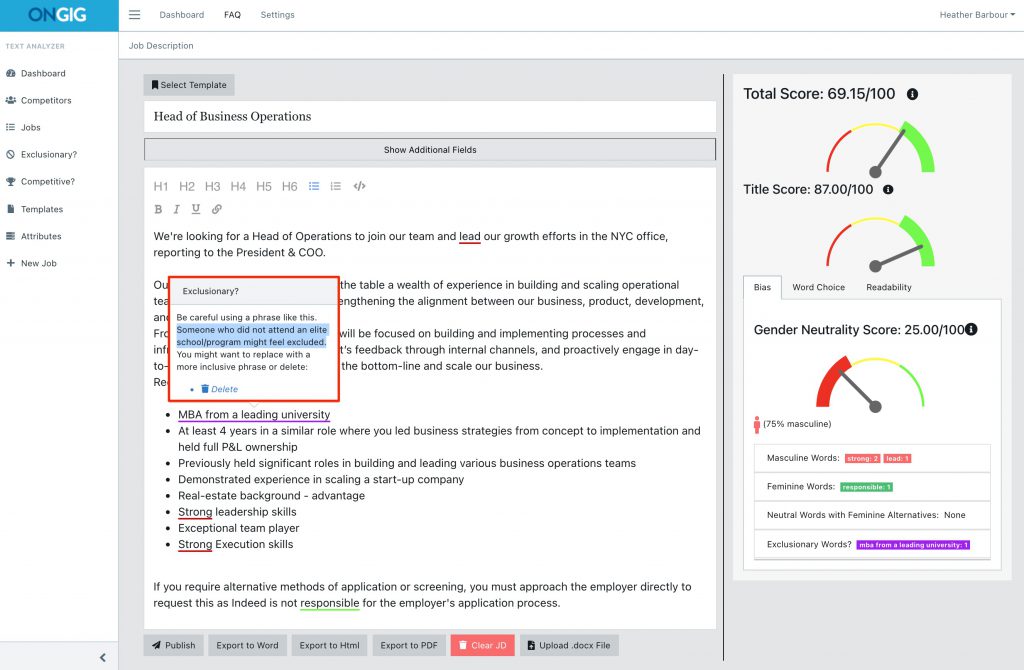- Why I Used Grok + Gemini and ChatGPT to Build My Outreach List (And How Recruiters Can Too) - January 22, 2026
- The Diversity & Inclusion Glossary — A List of 300+ Helpful Diversity Terms (2026 Update) - January 19, 2026
- Why You Need a Job Description Revision Tracker (Before Your Next Audit) - January 9, 2026
Elitist language often finds its way into your job ads. And, elitism at work causes hostile working relationships. Searching Indeed, I found 100’s of examples of elitist language in job postings. I put together this list of the 7 most used, plus:
- Tips on how to replace them with more inclusive language
- 20+ variations of the elitist language examples
But first, let’s define elitism.
What is elitism?
Some refer to elitism in the workplace place as the “good ol boys network.” It’s also defined as:
“the attitude that individuals with a certain quality, such as high intelligence, form a group of people who deserve more influence.”
source: LinkedIn, Elitism in the workplace (by Felix Dellner)
Now, on to the 7 elitist language examples:
1. “MBA from a leading university”
Asking a candidate to have an MBA from a leading university excludes people with an MBA from schools not considered “elite.”

Here are top examples of elitist language I found related to MBAs in job ads:
- MBA from a leading university
- MBA from a top business school
- MBA from a top university
- MBA from a top-tier university
- MBA from a top tier school
Tip: I suggest you replace this phrase with “an MBA” or delete the phrase entirely.
2. “Degree from a top 25 school”
If you require candidates to have a degree, that’s great. But asking them to have one from a top 25 school might be considered elitist language.
I found these 4 examples of elitist language in job ads for top 25 schools:
- Degree from a top 25 school
- Attended a top 25 school
- Graduated from a top 25 university
- Degree from a top 25 ranked university
Tip: You can replace “top 25 school” with something like “a college degree” to be more inclusive.
3. “Graduated from an Ivy League University”
There are only 8 Ivy League schools in the U.S., so asking an applicant to have a degree from there is a great example of elitism at work.
Here are top examples of elitist language I found related to the “Ivy League”:
- Graduated from an Ivy League University
- Candidates from Ivy league schools
- Degree from an Ivy League university
Tip: You can find excellent employees from the 5,300+ other universities in the U.S. I suggest removing this elitist language and replacing it with something like “a university graduate” or “has a college degree.”
4. “J.D. degree from a top law school”
Hiring an attorney? Do they really need to have a Juris Doctor degree “from a top school” to perform well in the role? My guess is no.
I found these 4 examples of elitist language in JDs for attorneys:
- J.D. degree from a top law school
- Degree from a top 25 law school
- JD from top law school
- A degree from a top law school
Tip: Try replacing this elitist language with “a JD degree” or “a law degree” to be more inclusive.
5. “Graduated from a top 10 (or top 20) school”
I found examples of “top 10” and “top 20” elitist language across many industries.
Here are top examples of elitist language I found related to “top 10 or 20 schools”:
- Graduated from a top 10 school
- Graduated from a top 20 school
- Degree from a top 10 business school
- Graduated from a top 10 computer science program
- Degree from a top 20 engineering school
- Graduated from a top 10 college
- Attended a top 10 design school
Tip: Here’s another time when you can simply ask a candidate to be a “college graduate” or “have a degree” in their field.
6. “High SAT/ACT scores”
I notice some employers ask for high scores on the SAT or ACT, mostly in entry-level job postings. Requiring an “SAT score of 1200+” excludes a lot of people.
I found these 5 examples of elitist language in job ads related to SAT and ACT scores:
- high ACT score
- minimum SAT score of 1250
- strong ACT score
- high SAT score
- scored strong on the ACT
Tip: Not everyone tests well or has the resources for tutoring or SAT prep classes. You might want to delete this requirement from your JDs to be more inclusive.
7. “A high GPA”
Does a potential employee’s GPA affect how they will perform the role you are posting? I found a few instances of employers asking for “a high GPA” on Indeed.
Here are top examples of elitist language I found related to GPAs:
- a high GPA
- GPA of 3.0+
- high GPA
Tip: Asking for or discussing grades might exclude candidates who did not perform well in school. This doesn’t mean they aren’t a good fit for the role. I suggest removing this requirement from your job postings.
WHY I WROTE THIS?
Ongig’s mission is to transform job descriptions. We’re happy to run your job postings through Text Analyzer and flag any elitist language you might have missed. You can request a demo to learn more.
